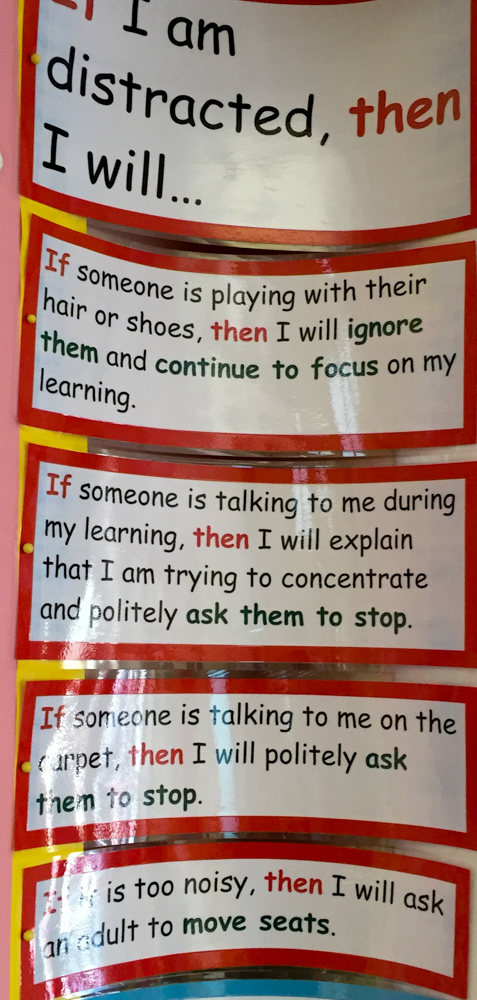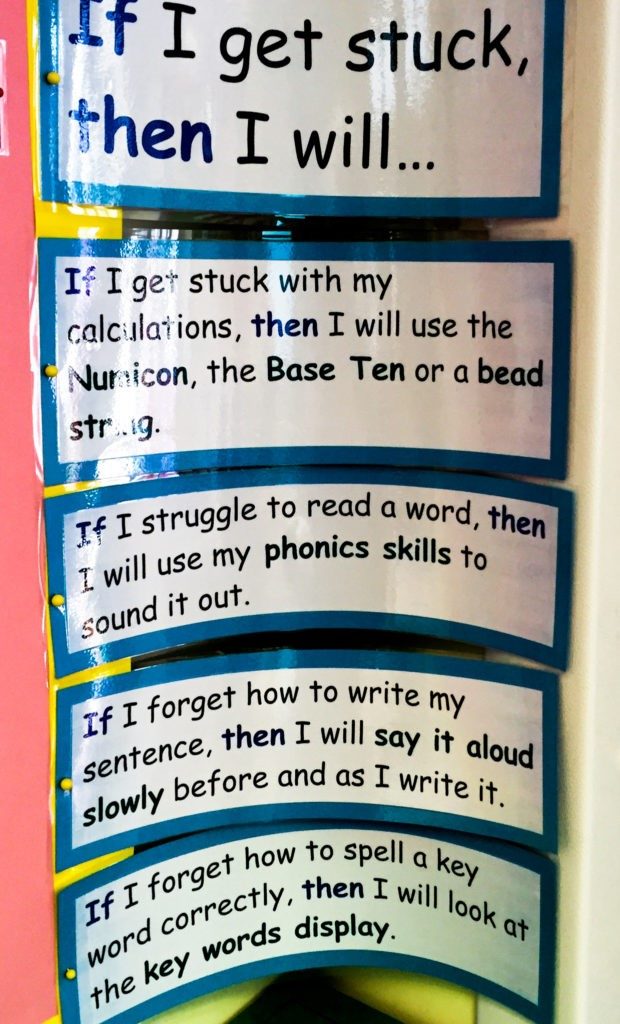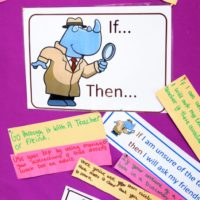Picking up on last week’s theme of learning language this week we take look at goals, a well used classroom word, and how we could make them more achievable.
One of the problems with goals is that they’re often couched in terms that are too big. Research tells us that our brain ignores goals if it’s unclear about what it needs to do; we only act on goals when what we need to do is clear.
In learning powered classrooms, where students are building on how to persevere and so forth, they often set themselves learning goals like ‘Manage my distractions’ or perhaps ‘Get myself unstuck’ The problem is these goals beg the questions ‘how?’ and ‘what do I do?’.
The idea of ‘If-Then’ plans is that they break down big goals. So if we want students to achieve their goals and change their behaviour we need to help them think much more closely about the ‘hows’ and the ‘whats’.
Why it works
If-Then planning came out of research into motivation, proposing an effective solution to the pitfalls of goal pursuit. It’s all about giving goals greater precision.
If-Then planning has been recognised in over 100 studies to be highly effective when it comes to resisting temptation and forming good habits, increasing your chances of reaching your goal by up to 300%.
If-Then plans (Gollwitzer 1999), where people commit themselves to doing a certain thing in a specific situation are commonly used in health psychology. These self-made plans capture pre-specified responses if a certain situation occurs. Deciding such things in advance reduces the demands you put on your willpower.
If-then plans go like this:
When setting a goal you need to specify not only what you will do but also where and when you will do it.
If (or when) [___situation__], then I will do [___behaviour__]
So going back to our goal about managing distraction, we need to know much more about the ‘how’ and the ‘what’; we need to inject more detail. For example:
If I’m distracted [by someone talking to me when I’m concentrating], then [I’ll politely ask them to stop].
This may sound a bit cumbersome to start with but research suggests far more goals are achieved by using If-Then planning. And the clever bit is that this builds self talk at the same time. You do what you are telling yourself to do. The If-Then plan succeeds because the situation and the action become linked in your mind. The brain recognises the situation as an opportunity to advance the goal. When the situation is detected, action is initiated automatically. If-Then plans are a good way of making new habits stick.
Putting If-Then plans into action in classrooms
Heathcoat Primary school in Tiverton used If-Then plans to help their students become more aware of tricky situations and what they could do to deal with them. They used If-Then to develop ideas about managing distraction and getting unstuck, and they looked at whether If-Then plans might generate helpful reminders in reading and numeracy.

Firstly they explored and listed the Ifs
The Ifs were the situations they wanted to remind themselves about. For managing distractions they listed all the sorts of distractions and the places and times these might happen and charted them up on the wall.
- If there’s lots of noise…
- If a friend talks to me, but not about what we are learning…
- If I get hungry…
- If I get tired…
- If I get stuck…
Then they explored and listed the Thens
They answered the question ‘what might we do in response to these Ifs?’, and added them to the wall.
- …Then I’ll move to a quiet place
- …Then I will ask her to concentrate on what we are doing
- …Then I will stop for an energy snack
- …Then I’ll find somewhere quiet for a while
- …Then I’ll take a break and come back to it later
The higgledy piggledy lists were then sorted into If-Thens with connecting lines and later they were made into useful reminder displays for the classroom walls.
Later they went on to explore If-Then planning for being stuck…
‘If…
…I get stuck in my reading… ‘and listed all their stuck places.
…I get stuck in Maths…’ and explored the bits they found tricky.
…I get into tricky situations in the playground…’ and explored what counted as tricky.
This more detailed brainstorming lead to personalised If-Then plans, suited to each child and each situation in particular.
Give yourself a challenge
First ask yourself…
- Have I encouraged my students to set themselves learning goals?
- What do they find difficult about achieving their learning goals?
- Are the learning goals too big and therefore would If-Then plans help?
- …so, where might I use If-Then planning?
And when you do make the switch…
- make a note of whether children are now achieving their goals. What improvement are you seeing? (It might not be 300%!)

If you already use If-Then plans, why not share your ideas and experiences with us below or on our Facebook page.


No comments yet.